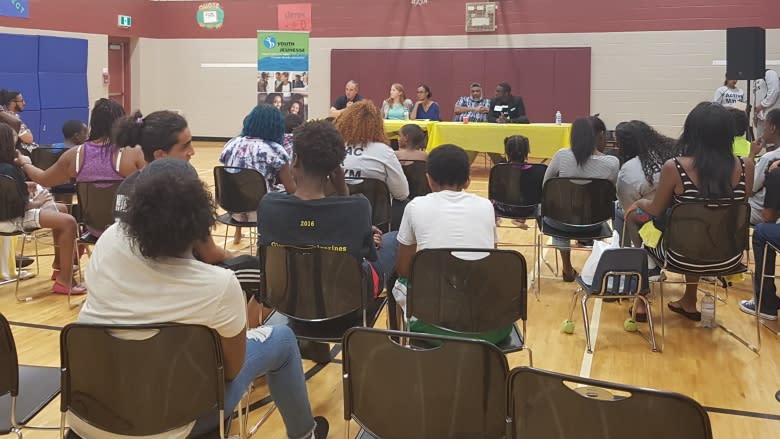Event sheds light on mental health issues in low-income communities
Youth organizers behind a mental health awareness event hosted Saturday said they're hoping their efforts will help break the stigma around mental health issues in low-income communities.
The event, Active Minds, took place at the Michele Heights Community Centre and was organized by the Ethno-Cultural Youth Advisory Committee and the Westend Youth Motivators, both affiliated with the Youth Services Bureau of Ottawa.
Dozens of children and parents attended the free event, which featured music, games, face-painting, and wrapped up with a panel disussion on mental health.
The youth who organized the event said it was important to start a discussion about mental health within the city's immigrant and low-income communities.
'Nobody really wants to talk about it'
"In our community, mental health is not really discussed," said Mishka Kana, one of the volunteer organizers. "It's kind of like a stigma. Nobody really wants to talk about it. So it's important that they learn about it and get exposed to it."
As a child of immigrants, Kana said there is a generational divide when it comes to the topic of mental health.
"I know about mental health and I've been exposed to mental health awareness," said Kana. "Our parents or our families are not used to that. So they'll be like, 'Just pray,' or 'Just ignore it.' They look past it. Not because they don't care, but just because they don't know any better. They don't understand it."
The youth said competing priorities often push mental health needs to the bottom of the pile.
"In low-income communities, there are so many other things that are the priority, like making sure that children or adults don't fall into gang violence, or drugs and addiction," said Mukhtar Ismail, who's been volunteering with the Youth Services Bureau for several years.
1 in 5 Ontarians would meet criteria for mental illness
According to Dr. Phil Ritchie, a psychologist at the Children's Hospital of Eastern Ontario, one in five people in Ontario would meet criteria for a diagnosable mental illness and the majority would develop that mental illness before the end of high school.
If parents knew that, they would understand the need to be having these kinds of discussions, Ritchie said during a panel discussion at Saturday's event.
"When their kids are struggling, it's not because they have a bad attitude, or because they've been corrupted by values in a different country than they were raised in," he said. "It may just be because they're human, and like the rest of us, some of them will suffer from mental illness."
He said people will often leave their mental illnesses untreated until it gets so bad it can no longer be ignored.
"The earlier we're aware of it, the earlier we get help for somebody, and the better the outcome," he said.
Simply having these conversations goes a long way in breaking down that stigma, Ritchie added.
"Coming out into the community gives us a great opportunity to answer some of the questions people have. And in doing so, hopefully demystify the whole thing, and ideally take away some of that stigma."



